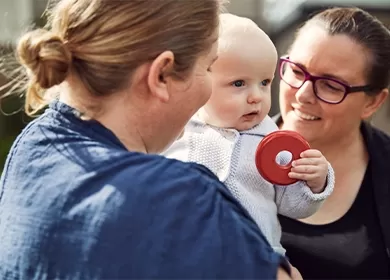Breast milk bank opens in Brisbane to bring "liquid gold" to premature and vulnerable babies
Premature babies across Queensland now have access to “liquid gold” donated breast milk from a dedicated facility that was opened today by the Hon. Trevor Evans MP.
Funded by the Australian Government Department of Health, the facility is a merger between Lifeblood Milk and Queensland Milk Bank, and will be a foundation to meet future demand for donated breast milk, which is expected to rise by 1,000 litres annually over the next two years.
A mother’s own milk is always best, but if a mother doesn’t have a sufficient supply, donated breast milk is recommended to reduce the risks of some health challenges premature babies can face.
The facility will collect, pasteurise, and distribute more than 1,500 litres of donated breast milk “on demand” to babies in six neonatal intensive care units and 13 special care nurseries across Queensland every year.
Federal Member for Brisbane, Trevor Evans MP, welcomed the opening of the milk bank and Australian Red Cross Lifeblood’s commitment to Queensland infants.
“Lifeblood – in collaboration with the Queensland Milk Bank – has established the facility six months ahead of schedule. Babies across a network of 19 Queensland hospitals are already receiving life-giving human milk that is protecting their wellbeing,” Mr Evans said.
“But that is only part of the important work of the milk bank. The new Brisbane facility will also allow our leading scientists to undertake innovative research into new therapeutic applications using the bioactive compounds in milk. This work will develop new products to help premature and sick babies thrive”.
Around 5,000 babies are born premature in Queensland every year, and an estimated 360 milk donors will be needed in Brisbane every year to meet demand.
Mothers in the Brisbane area who produce an excess of breast milk may be able to donate to Lifeblood Milk, and are able to express, freeze and store their breast milk in their own home.
The facility also provides an Australia-first research opportunity to track the benefits of donated breast milk for babies born later than 32 weeks, with most states providing breast milk for early preterm babies only.
Lifeblood Chief Executive Shelly Park said the research project was an amazing step forward in Lifeblood’s vision to make a greater contribution to healthcare in Australia.
“To be able to join forces and improve health outcomes for Queensland’s most vulnerable newborn babies is remarkable, and we’re grateful to Queensland Milk Bank for collaborating with us in the delivery of this innovative project.”
For more information, visit www.lifeblood.com.au/donors/milk


